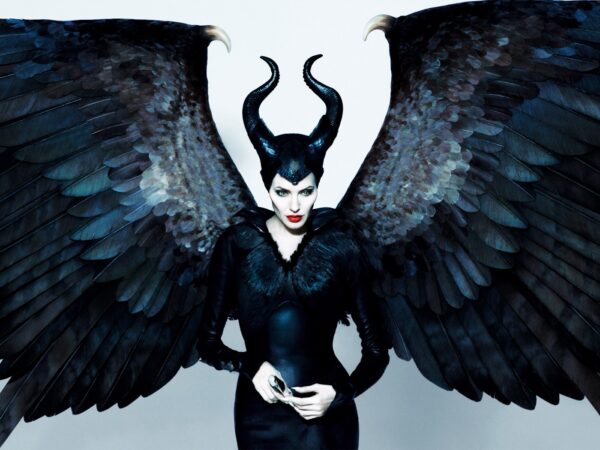Ah, Maleficent. (Not a review; just a few notes.)
This post is going to have a few spoilers for the movie and probably needs trigger warnings for the topic of sexual assault.

You know that moment when you see a movie that you want to be great — and in some ways it is great! — but not all ways? That was me, watching Maleficent. This was one of my most anticipated movies of the year. Maybe THE most. I kind of ridiculously love Angelina Jolie. If you ever asked me who I’d cast in DEMON ANGEL as Lilith, it would be she, unquestioningly. She has that lovely dark edge and can make wicked look so fun. So when I heard she was cast as Maleficent, I thought: Holy shit, as if there could be anyone else!
But I’ll admit, my number one hope for the movie was this: That she didn’t turn evil because of disappointed love. In a way, I both got my wish…and I didn’t.
Obviously, her lover betrayed her. The part of my story-writing brain that doesn’t shut off keeps saying “Man, I wish that the reason she went evil was because of the war with the humans, and the Moors were destroyed and she turned evil out of revenge.” Because that would be an awesome story! And completely justified. If King Stefan had led an army into her land and we watched the humans smash and kill all those cute fairy people, we’d probably be cheering as she went to curse him and his baby daughter. It would still be a completely understandable descent into evil, and it’s not the usual “I’ve been betrayed by a man” backstory that we so often see in tales like these, when the woman becomes evil because a guy was an asshole (although, of course, that guy is usually the hero of that particular story).
But! … I still liked the message of this movie. Mostly.
AGAIN, WARNINGS FOR CONTENT AHEAD.
Because I have a hard time reading what Stefan did to her as anything but rape. He drugged her; he violated her. It was so uncomfortable to watch, and it was also a horrifyingly familiar story. So it wasn’t just a betrayal of love, in which he married someone else for ambition (which was the story I feared most). It was betrayal of trust. If he’d only been a friend, it would have been exactly the same story, and her anger would have been just as justified.
And personally, I just love seeing female rage played out on the screen, especially when she doesn’t apologize for it (apologize to the one who betrayed her, I mean. Because I thought the second message and acknowledgment of how anger can wound those you don’t intend to hurt was quite nice. But I sure did like the way her anger hurt Stefan.) And a part of me thinks: We’ve seen this story too many times — the woman is hurt by a man, and that motivates her to become something that she wasn’t before.
But at the same time … this is a betrayal that happens over and over to real women. Physical violation is all too common. So of course the story is also common.
One difference, though, is that she was immensely powerful *before* the betrayal. In so many other stories, the abuse and violation either gives something to the character (or steals it.) And although Maleficent lost her wings, it’s hard to argue that she was any less powerful or more powerful because of it.
No, she was just pissed. Justifiably pissed. And I liked that.
So, anyway. I’m still working through my feelings for this movie. I suspect it will take several viewings (and I still won’t come away completely satisfied.) But a few things in general:
- I love how, in this and Frozen and a couple of other recent films, the traditional romantic love that so often saves the day is being replaced with just love … and especially love between females. Yes, please. I love romance. Obviously, I love it. But we need more movies like this — especially when they are movies marketed to girls. Despite all the flaws in all these movies, that’s one message I’m glad to see.
- I hated how — in a movie with an otherwise really lovely feminist message — the mother died off-screen. Obviously Maleficent replaced the queen as the mother, but after what that poor woman must have suffered after her baby was cursed (then sent away from her), then living with an asshole like Stefan, it would have been nice to see a) Maleficent apologize to her, too and b) that she had lived. Was it just easier to kill her off so that the narrative wouldn’t have to deal with that? I’m not sure. But I thought that it weakened the movie, because it swept the mother away like a piece of nothing. First she’d been given away like a piece of property to Stefan; then she was basically sacrificed to the narrative and to show how callous he was. Combined with the knowledge that Aurora was essentially conceived through rape (Stefan would have never been in the queen’s bed if he hadn’t violated Maleficent, who then became Aurora’s mother) … I have not worked all the way through this yet. I just know that I hated the way the mother was discarded after she’d fulfilled her use as a birthing vessel.
- I wish that Aurora had more of a personality. I wish everyone had more of a personality. But then, I’m not sure if it would have mattered. Any time Jolie was on the screen, pretty much no one else existed, so even if Aurora had been more than a dreamy, happy, and pretty girl, I might not have noticed anyway.
- GOD DAMN it was hard to look away from Jolie as Maleficent. I’m pretty sure I would have been happy with the movie if it had consisted of nothing but Maleficent standing in dramatic lighting and smiling every once in a while.
- I kind of wish Maleficent had been more wicked. Fun wicked. But still more wicked all the way through.
Anyway.
ETA: OH, ALSO! “Movies with women as the lead don’t attract audiences and don’t make money?” Fuck you, Hollywood. And DC. Now I want my freaking Wonder Woman movie.



